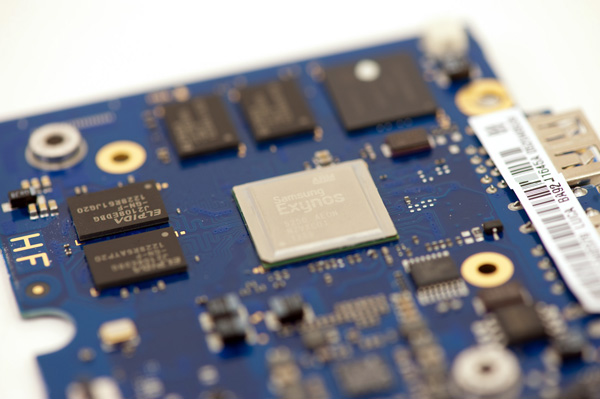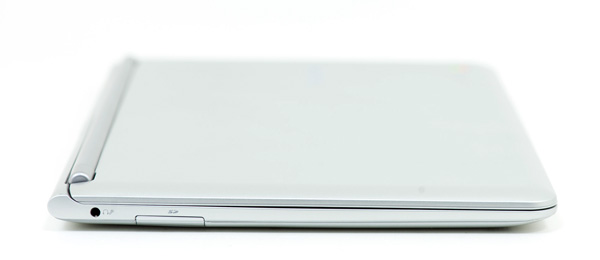Samsung Chromebook (XE303) Review: Testing ARM's Cortex A15
by Anand Lal Shimpi on October 31, 2012 9:00 AM ESTFinal Words
The move to ARM doesn't fundamentally change the performance or usability of the Chromebook. It's still a slow (relative to more expensive notebooks), limited use notebook. That's not necessarily a bad thing, but you need to be aware of what you're getting into with this thing.
The display is functional but not very good. Build quality is decent but the new Chromebook is still a plastic notebook. Thankfully the keyboard and trackpad are both pretty decent.
For a basic web browsing and glorified typewriter platform, the Chromebook really does get the job done. It's a very focused, simple device that serves its purpose well. I don't know how big the Chromebook niche is, but Google has targeted it very well. At $249 if you need a physical keyboard and only need basic web browsing support, I don't know that there's a better solution. As an almost-disposable notebook for writing and browsing the web, I'm happy with the Chromebook. Good ultraportables are much more expensive, and even low cost PCs don't come with any sort of solid state storage. Admittedly the eMMC solution in the Chromebook isn't setting any records, but it does deliver consistent IO performance which is more than I can say for a cheap 5400 RPM 2.5" hard drive.
Ultimately the Chromebook puts pressure on the traditional PC notebook ecosystem from below. Tablets have been doing that for a while but they are a physically different form factor. For those who still want a traditional notebook form factor, there hasn't been much low-cost competition. The Chromebook applies a good amount of pressure there. Compared to a $1000 notebook, the Chromebook's display isn't great but move down into the $500 - $700 range and it doesn't look all that bad thanks to many PC makers failing to invest in good quality panels. If a $249 Chromebook delivers a competitive keyboard, trackpad, display resolution and quality experience to your $499 PC notebook, it's time for a change. With Apple pushing at the top and Google working the bottom, the hope is that the entire PC notebook stack gets better.
On the SoC side, our first look at ARM's Cortex A15 is quite positive from a performance standpoint. I'm still not convinced on its power consumption for smartphone use (big.LITTLE must exist for a reason) but from a performance standpoint, it's going to make current smartphone/tablet SoCs feel very slow. And that's something we can all look forward to in 2013.












149 Comments
View All Comments
MadMan007 - Wednesday, October 31, 2012 - link
It is a valid comparison, however there is an unanswered question: What do I get for stepping up to the Celeron Chromebook? And that is a valid question, even though at that price point there are more options.Selden - Wednesday, October 31, 2012 - link
By stepping up to the Samsung 550, you get a larger and brighter (300 nits vs 200 nits) screen (but lower resolution, 1280x800), 4 GB of RAM, slightly better faster CPU performance, longer battery life (much bigger battery), and a card reader slot that doesn't let the card stick out (approx. 1 cm) from the case. For performance, the 4 GB of RAM is probably the most significant factor, as it lets you open many more tabs.jeffkro - Wednesday, October 31, 2012 - link
You also get the ability to play netflix content.LogOver - Thursday, November 1, 2012 - link
Some benchmarks shows 50-80% better performance for 1.3Ghz Celeron-based chromebook.http://gigaom.com/mobile/intel-v-arm-the-chromeboo...
I would like to see confirmation from Anand. Also some GPU benchmarks (Celeron vs. Exynos) would be welcomed.
krumme - Friday, November 2, 2012 - link
And that just proves celeron is no competitor for A15 as the performance difference means nothing compared to the total cost differences for the intended segment.An more interesting comparison would even be to the old AMD APU bobcat, in some low voltage variants.
But ofcourse its the new lowcost AMD/Intel variants that is going to be the main competitors.
LogOver - Friday, November 2, 2012 - link
Samsung asks ~$450 for Celeron Chromebook, but this doesn't mean that Celeron-based netbooks have to be expensive. You can buy Acer AO756 for just $265 from bestbuy (and it inclides$100 Win Home Premium and 320Gb HDD which chromebook lacks)http://www.bestbuy.com/site/searchpage.jsp?_dyncha...
And if you wish, you can install Chrome OS on it by yourself.
AgeOfPanic - Wednesday, October 31, 2012 - link
Anand, could you tell us how it compares to the Atom in day to day use? I currently own a Samsung Series 5 chromebook and I would like to know if it makes any sense to upgrade to this model. Seems I would have to take a hit in battery life, but I heard you can at least watch 720p Youtube videos on it.Krysto - Thursday, November 1, 2012 - link
You can watch 1080p videos on it if you want. It has a vastly better GPU. Maybe you can sell yours, and pay little to no difference to get this new one. The performance improvement overall should be noticeable.AgeOfPanic - Thursday, November 1, 2012 - link
Anand doesn't seem to be too convinced. Performance in normal browsing seems acceptable. Don't really understand, because Chrome on a tablet is plenty fast.krumme - Wednesday, October 31, 2012 - link
It looks like ARM 15 is making it very difficult for Intel and AMD for this low cost market. Especially with win8 machines comming.I dont know how Intel can catch up to this competition with the new Atom. When 22nm Atom hits market, TSMC is printing dirt cheap A15 on 28nm for everyone and his brother; tablets, phones, notebooks. Heck even some server segments is going Arm. And the performance looks like its sufficient for grandma.
The new Atom and new bobcat better have some tangible performance benefits both on cpu and gpu side - they simply need to drive most if not all, pc games well on a notebook.
I am impressed by the performance of ARM here.